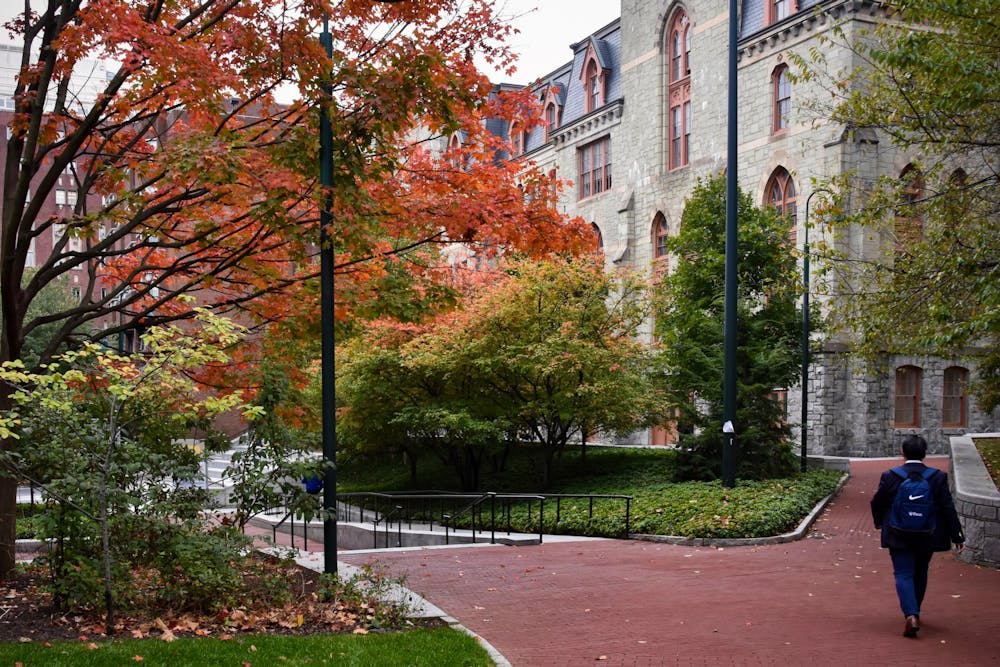
Penn has reversed its decision to conduct a hybrid fall semester and will no longer invite students back to campus.
Credit: Melanie HilmanFollowing a spike in COVID-19 cases across the United States, Penn is no longer inviting students back to campus for the fall semester and is encouraging all students not to return to Philadelphia.
Penn President Amy Gutmann and Provost Wendell Pritchett sent an email to the Penn community on Tuesday announcing that the University will scratch its plans to conduct a hybrid fall semester that guaranteed on-campus housing for first years, sophomores, and transfer students in the College House system. Penn will not raise tuition by 3.9% for the fall semester as planned by the University Board of Trustees on Feb. 27.
The vast majority of undergraduate fall classes will be held online with very few in-person offerings such as clinical experiences in The School of Nursing. Graduate schools are continuing to evaluate their own fall operations.
"The sheer number of students who by Pennsylvania public health recommendation would now upon arrival—or based upon testing or high-risk exposure—need to go into a two-week quarantine is untenable," Gutmann wrote. "At the same time, supply chain issues have more severely limited the availability and the turn-around time of COVID testing than medical experts foresaw. Since we last communicated we learned that our planned pre-testing regimen would not be possible."
As of Aug. 4, Penn has had a total of 180 confirmed or probable COVID-19 cases — which comprise of undergraduate, graduate, and professional students currently in the country and abroad — since it began COVID-19 testing in March.
The email was also signed by Executive Vice President Craig Carnaroli and J. Larry Jameson, Perelman School of Medicine dean and executive vice president of the University of Pennsylvania for the Health System.
The General Fee, which increased 4.2% from last year, will now be reduced by 10% for the fall semester, the email read. Housing and dining fees that have been paid by students will be credited or refunded in full.
Gutmann wrote that there will be no physical on-campus activities throughout the semester.
The University will extend the optional pass/fail grading policy implemented in spring 2020 to the upcoming semester, according to The Fall Semester Planning FAQ. All undergraduate students in all undergraduate Schools will be able to opt into pass/fail grading by Oct. 30 for any courses including those taken to satisfy major or general education requirements.
Students who were assigned a room and did not cancel the assignment before Aug. 11 are guaranteed on-campus housing for spring 2020, according to the FAQ. Room location, however, may change due to potential public health requirement changes.
University housing will only be able to accommodate limited exceptions for international students and those dealing with "significant housing or personal hardships," Gutmann wrote. According to the MyHomeAtPenn website updated earlier today, students who wish to return to campus must complete a housing exception form by Aug. 17 at 5:00 p.m. The form will become available Tuesday evening.
"While we have great confidence in the high quality of this educational and college life experience, we deeply regret that these changes represent a significant disappointment to families and students," Gutmann wrote.
On June 25, Penn announced a hybrid fall semester that guaranteed on-campus housing for first years, sophomores, and transfer students in the College House system. The email read that the University had also leased additional off-campus space to accommodate housing for juniors and seniors who had applied for on-campus housing and could not be accommodated.
According to an undergraduate student survey conducted by The Daily Pennsylvanian in late July, approximately 78% of 906 respondents planned to return to campus this fall, but when asked to rate their trust in the Student Campus Compact on a scale of one to five — one being "not at all," and five being "completely" — the average response was 2.61.
Students who planned to stay at home expressed concerns that some students would not follow the Campus Compact health guidelines and that these guidelines would not be enforced by the University. The guidelines include maintaining a six-foot physical distance from others, wearing facial coverings, and using the mobile app PennOpen Pass for daily wellness checks.
Chief Wellness Officer Benoit Dubé told the DP that Penn's ability to monitor whether students are following the Campus Compact would generally be on the honor system without strict University oversight. While the Compact Review Panel — a team of faculty, administrators, and students — would have assessed complaints and determined the appropriate response for each case, Dubé said Penn's campus would not be a "police-state."
Penn announced on Aug. 4 that all domestic undergraduate students should expect a self-administered saliva testing kit to be mailed to their home address between Aug. 8 and Aug. 12. Those with a positive test result would have been required to quarantine at home for 14 days prior to coming to campus.
The Daily Pennsylvanian is an independent, student-run newspaper. Please consider making a donation to support the coverage that shapes the University. Your generosity ensures a future of strong journalism at Penn.
Donate






